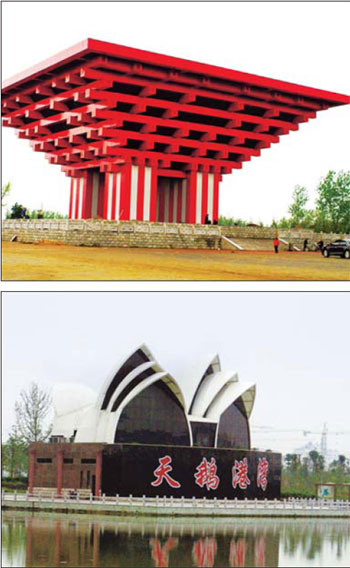Society
Local officials save face, the people lose
By Zhou Wenting (China Daily)
Updated: 2011-03-23 07:42
 |
Large Medium Small |
|
 Reproductions of the China Pavilion (top) and Sydney Opera House, from a file photo taken in Funing, last year. [Li Gen / For China Daily] |
Instead of looking for ways to improve people's lives, they squander money on vanity projects
BEIJING - Projects done by local leaders who want to build up their image while ignoring the real needs of the people have been widely criticized in recent years, but are more prevalent than one might think, according to a recent poll.
The survey was done by China Youth Daily's social research center, on minyi.net.cn and sina.com.cn, from March 15 to 21, and got responses from more than 1,600 people online.
A shocking 97.5 percent of them said that there were image projects in their cities, with half of them saying that they are quite common.
One example was the city of Xi'an, Shaanxi province, which suffers from serious water-supply challenges, but has spent 500 million yuan ($76 million) on a musical fountain, which it claims is the largest in Asia.
Then there is lonely Funing in an under-developed part of Jiangsu province, which allocated 3.5 million yuan for building a copy of the China Pavilion at Expo 2010 Shanghai.
"That project, and another copy of the Sydney Opera House, not only didn't win the approval of local people, it became notorious among news people all over the country," complained 30-year-old Li Qi, of Xiangshui county, a neighbor of Funing.
"Even though Funing is a coastal area, its economy really lags behind that of many counties in the booming Yangtze River Delta region. It's a sheer waste of energy and money to set up such extravagant buildings," Li said.
This opinion is shared by many of those responding to the survey, with 70 percent objecting to this waste of public funds.
"These projects don't do anything at all to improve people's lives, such as employment or education. The government should put that money into road repairs or other infrastructure, which can benefit the common folk," said Qiu Yan, a native of Yancheng in Jiangsu.
Nearly 80 percent of the respondents said people's welfare should come ahead of image building.
"Attractive city facilities are no doubt important, but what could be better than having the streets filled with happy people," was how Qiu Yan put it.
One of the main reasons that these face-saving or face-lifting projects go up is the lack of public supervision, according to some. And, local governments are motivated by the desire for or craving of greatness and success.
"In this old appraisal system where economic growth is the index of an official's political performance, officials need to have some achievements to show the authorities," explained Zhao Chenggen, a professor of government at Peking University, who was quoted by China Youth Daily.
Hu Xingdou, an economics professor at the Beijing Institute of Technology, said that 90 percent of China's poverty alleviation funds go to local governments.
However, much of this money is seen as additional revenue and spent on unnecessary projects, Hu said. They might be intending to reduce poverty, but actually they end up making people poorer.
Hu also said the way we assess officials needs to be improved. He suggested adding local people's reviews to the appraisal system.
One way to prevent the further growth of image projects, Hu said, is to separate the economy and politics.
"Local governments should not be involved in attracting investment. Government's role is to create a well-rounded environment that includes livelihood, public order, investment, and nature," Hu concluded.
China Daily